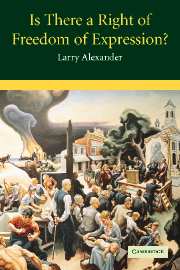Book contents
- Frontmatter
- Contents
- Acknowledgments
- Introduction
- PART ONE DEFINING HUMAN RIGHTS AND DELIMITING THE SCOPE OF FREEDOM OF EXPRESSION
- 1 Preliminaries: What Is a Human Right, and What Activities Implicate Freedom of Expression?
- 2 Freedom of Expression and Regulations that Affect Messages But are Not Enacted for That Reason
- 3 The Puzzles of Governmental Purpose
- PART TWO THE CORE OF FREEDOM OF EXPRESSION: GOVERNMENT REGULATIONS AND ACTS TAKEN TO AFFECT MESSAGES
- PART THREE THEORETICAL PERSPECTIVES ON FREEDOM OF EXPRESSION
- EPILOGUE
- Index
2 - Freedom of Expression and Regulations that Affect Messages But are Not Enacted for That Reason
Published online by Cambridge University Press: 07 January 2010
- Frontmatter
- Contents
- Acknowledgments
- Introduction
- PART ONE DEFINING HUMAN RIGHTS AND DELIMITING THE SCOPE OF FREEDOM OF EXPRESSION
- 1 Preliminaries: What Is a Human Right, and What Activities Implicate Freedom of Expression?
- 2 Freedom of Expression and Regulations that Affect Messages But are Not Enacted for That Reason
- 3 The Puzzles of Governmental Purpose
- PART TWO THE CORE OF FREEDOM OF EXPRESSION: GOVERNMENT REGULATIONS AND ACTS TAKEN TO AFFECT MESSAGES
- PART THREE THEORETICAL PERSPECTIVES ON FREEDOM OF EXPRESSION
- EPILOGUE
- Index
Summary
In this chapter I am going to show why any right of freedom of expression must have as its central concern government's purposes for regulating activities rather than the effects of regulations on messages intended to be conveyed by speakers or on messages received by audiences. I am going to do so by demonstrating that principle (4), the principle that freedom of expression is implicated whenever government affects an audience's ability to receive messages intended by speakers, is potentially limitless and incapable of being cabined in any internally consistent way. If principle (4) is untenable, then principle (5), whose focus is on government's purposes in regulating rather than on the effects of regulation, is the only principle defining the scope of freedom of expression left in play.
To eliminate principle (4) and secure the dominance of principle (5), I shall focus on government regulations that are not enacted to affect what messages are sent and received but that nonetheless have an impact on what messages are conveyed and received. The free speech cases generated by such regulations in American constitutional law are what Laurence Tribe calls Track Two cases, and those cases, along with some analogous cases from other countries, shall serve as my principal positive law examples in this chapter. (The American Track Two jurisprudence is far more extensive and developed than any other jurisdiction's Track Two jurisprudence.)
- Type
- Chapter
- Information
- Is There a Right of Freedom of Expression? , pp. 13 - 37Publisher: Cambridge University PressPrint publication year: 2005
- 1
- Cited by



